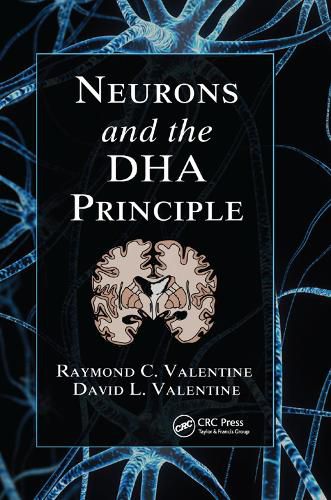Readings Newsletter
Become a Readings Member to make your shopping experience even easier.
Sign in or sign up for free!
You’re not far away from qualifying for FREE standard shipping within Australia
You’ve qualified for FREE standard shipping within Australia
The cart is loading…






Studies with bacteria and other systems suggest that the omega-3 fatty acid DHA confers great benefits to neurons in maximizing both speed of neural impulses and energy efficiency. Unfortunately, studies also show that DHA’s ease of oxidation damages membrane integrity. Exploring this duality, Neurons and the DHA Principle proposes a new model for the causes of neurodegeneration, in which DHA-enriched membranes of neurons become dysfunctional and energetically wasteful, triggering the premature death of neurons.
The challenge of this book is to digest how DHA acts as an essential building block of neurons while also conspiring for their assassination during aging. As the book reviews the extraordinary properties of DHA in life forms from deep-sea bacteria to human neurons, it asks:
Is there a trade-off between speed and efficiency of brain function enabled by DHA versus longevity or life span?
Has modern medicine advanced significantly in the treatment of the body but not necessarily of the brain?
What are the molecular explanations for the decline in brain health during the age of longevity?
A full accounting of the roles of DHA in neurons requires balancing the enormous benefits of these molecules against the risks. Introducing the dual chemical personalities of DHA from an evolutionary perspective, Neurons and the DHA Principle explores DHA from the standpoint of benefit-risk analysis, opening new perspectives for understanding how DHA functions in neurons.
$9.00 standard shipping within Australia
FREE standard shipping within Australia for orders over $100.00
Express & International shipping calculated at checkout
Studies with bacteria and other systems suggest that the omega-3 fatty acid DHA confers great benefits to neurons in maximizing both speed of neural impulses and energy efficiency. Unfortunately, studies also show that DHA’s ease of oxidation damages membrane integrity. Exploring this duality, Neurons and the DHA Principle proposes a new model for the causes of neurodegeneration, in which DHA-enriched membranes of neurons become dysfunctional and energetically wasteful, triggering the premature death of neurons.
The challenge of this book is to digest how DHA acts as an essential building block of neurons while also conspiring for their assassination during aging. As the book reviews the extraordinary properties of DHA in life forms from deep-sea bacteria to human neurons, it asks:
Is there a trade-off between speed and efficiency of brain function enabled by DHA versus longevity or life span?
Has modern medicine advanced significantly in the treatment of the body but not necessarily of the brain?
What are the molecular explanations for the decline in brain health during the age of longevity?
A full accounting of the roles of DHA in neurons requires balancing the enormous benefits of these molecules against the risks. Introducing the dual chemical personalities of DHA from an evolutionary perspective, Neurons and the DHA Principle explores DHA from the standpoint of benefit-risk analysis, opening new perspectives for understanding how DHA functions in neurons.